Lately I’ve been having a lot of conversations around investment terms with searchers, as well as investors.
About 15 years ago, I interned at a search fund. And, over the last few years, I’ve started to invest in the asset class going direct as well as through funds of search funds.
Investing in search funds is a great way to scratch my entrepreneurial itch, extremely rewarding when a searcher finds success, and can be economically rewarding too.
This post is my attempt to share thoughts on self funded search economics in an effort to contribute to the search fund community, get feedback on my thinking from a wider audience, and of course meet more people who are doing searches/investing and may want to collaborate (please feel free to reach out!).
You can watch a video of me explaining this model here, and download the excel here:

Enterprise Value
The standard finance equation is enterprise value = debt + stock – cash. Enterprise value is how much the company itself is worth. Many times people confuse it with how much the stock is worth and find the “minus cash” part of this really confusing.
So, you can rearrange this equation to make it stock = enterprise value – debt + cash. Make more sense now?
Enterprise value is just how much you’re willing to pay for the company (future cash flows, intellectual property, etc), not the balance sheet (debt and cash).
Most investors and searchers think about the EBITDA multiple of a company on an enterprise value basis because they’ll be buying it on a cash free, debt free basis. It becomes second nature to think about EBITDA multiples and know where a given business should fall given scale, industry, etc.
However, I believe this second nature way of thinking of things can be a massive disadvantage to investors given the way EV and multiples are talked about in our community currently.
Sources of capital, the typical way to calculate enterprise value for self funded searchers
If you’ve ever looked at or put together a teaser for a self funded search deal, you will notice that the deal value is equal to the sum of the sources of capital minus deal fees and cash to the balance sheet.
As a simple example, if there is $4 mm of debt to fund the deal, $1 mm of equity, and $200k of deal fees, the enterprise value = $4 mm + $1 mm – 200k = $4.8 mm.
We’ll use slightly more complex numbers in our example: If a searcher is taking a $3.2 mm SBA loan, $850k seller note, putting in $120k themselves, getting $350k of equity from the seller, a $500k earnout, and $1.2 mm of equity financing minus $350k to the balance sheet and $250k of deal fees, then the enterprise value will be $5.62 mm.
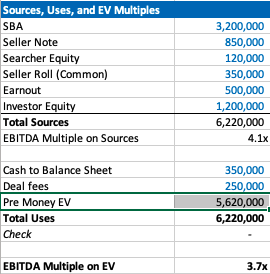
Our example company has $1.5 mm of EBITDA, so the EBITDA multiple is 3.7x. This is a pretty attractive acquisition multiple for a business that meets traditional search criteria (recurring revenues, fragmented competition, high gross margins, low customer concentration, etc).
If you’re seeing a search fund deal for the first time, the headline of “we’re buying a decent company for 3.7x, and replacing a tired owner with a hungry operator” is pretty exciting!
However, if you’re an investor, there is some nuance to this enterprise value number and the true EBITDA multiple you are investing in.
The trick with self funded enterprise value
The security that most self funded search investors get in a deal is participating preferred stock with a paid in kind dividend. This means when there’s an exit, you get your money back before any other equity holder, then get a certain percent of the business, and whatever dividend you’ve been owed in the interim accrues to your principle.
It’s a really favorable security for the investor, and one that is basically impossible to get in VC where straight preferred stock is much more common (no pun intended).
The key terms are what percent of common equity does this security convert into after the originally principal is paid back, and what is the dividend.
The share of common equity the investor group will get typically ranges from 10-50% of the total common stock. The dividend rate is usually 3-15%. The average I’m seeing now is around 30% and 10% for common and dividends respectively.
The strange this about the enterprise value quoted to investors in a teaser/CIM is that it doesn’t change as the percent of common changes, even though this has large implications for how much the common equity is worth and the value investors receive.
For example, I may get a teaser where the sources of investment – cash to balance sheet – deal fees = $3.7 mm for a $1 mm EBITDA company, which would imply a 3.7X EBITDA multiple. Let’s say the searcher is offering investors 30% of the common and a 10% dividend.
Let’s now say that the searcher is having a tough time raising capital and changes their terms to 35% of common and a 12% dividend. Does the effective enterprise value change for investors? I would argue yes, but I would be surprised to see it changed in the CIM/teaser.
This isn’t a knock on searchers or the search fund community. It’s just kind of how things are done, and I think this is mostly because it’s really hard to think about how the enterprise value has changed in this scenario.
However, the natural way of using EBITDA multiples to think about value for a business that is so common in PE/SMB can be extremely misleading for investors here. You may be thinking 3.7X for this type of business is a great deal! But, what if the security you’re buying gets 5% of the common?
If you’re in our world, you may counter this point by saying most searchers will also supply a projected IRR for investors in their CIM. However, IRR is extremely sensitive to growth rate, margin expansion, and terminal value. While the attractiveness of the security will be reflected, it can be greatly overshadowed by lofty expectations.
To get more clarity and have a slightly different mental model on the effective price investors are paying for this business, let’s go back to basics. Enterprise value should be debt + preferred stock + common stock – cash.
We know the values of each of these numbers, except the common. So, the main question here becomes: how much is the common equity worth?
Calculating value of common equity for self funded search funds
Equity value for most search fund deals = preferred equity from investors + the common equity set aside for the searcher and sometimes also advisors, board, seller.
We know that the preferred equity is investing a certain amount for a certain amount of common equity. The rub is that they are also getting a preference that they can take out before any common equity gets proceeds, and they are getting a dividend.
So, the exercise of valuing the common equity comes down to valuing the preference and dividend.
In my mind, there are three approaches:
- The discount rate method where you take the cash flows you’ll get in the future from the pref/dividends and discount them back at the discount rate of your choice. I am using 30% in my model which I believe accurately compensates investors for the risks they are taking in a small, highly leveraged investment run by an unproven operator. If you believe in efficient markets, this number also fits as it mirrors the historical equity returns as reported by the Stanford report, with a slight discount given this asset class has clearly generated excess returns relative to other assets on a risk adjusted basis, hence interest in these opportunities from an expanding universe of investors.
- The second method is to calculate how much money you’d get from your preference and dividends, taking into account that per the Stanford study around 75% of search funds will be able to pay these sums, and then discount these cash flows back at a rate more in line with public equities (7% in my model). This yields a much higher value to the preference/dividend combo, and therefore lowers the implied value of the common equity.
- The last method is to just say nope, there is no value to the preference and dividend. I need them and require them as an investor, but they are a deal breaker for me if they aren’t there, and therefore they don’t exist in my math. This of course makes no logical sense (you need them, but they also have no value?), but I’ve left it in as I think many investors probably actually think this way and it creates a nice upper bound on the enterprise value. Side note, as with obstinate sellers, jerk investors are usually best avoided.
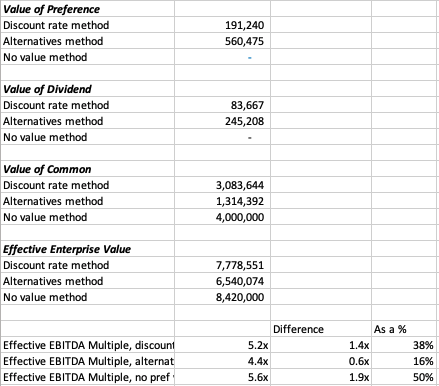
In our example, you can see a breakdown of the preference value, dividend value, and therefore common value and enterprise value for this deal.
In each case, the effective EBITDA multiple moves from 3.7x to something much higher (see the last 3 lines).
There are some simplifying assumptions in the model (no accruing dividend, all paid in last year), and some weird stuff that can happen (if you make the hold time long and the dividend greater than the 7% equity discount rate, the value of the dividend can get really big).
These flaws aside, I think this creates a nice framework to think through what the common is actually worth at close, and therefore what enterprise value investors will be paying in actuality.
It’s worth noting that the whole point of this is to benchmark the value you’re getting relative to market transactions in order to understand where you want to deploy your capital.
This creates a method to translate cash flow or EBITDA multiples of other opportunities on an apples to apples basis (if only there were a magical way to translate the risk associated with each as well!).
Another note, we could calculate the value of the common to be what this asset would trade at market today in a well run auction process minus any obligations (debt, preference, seller financing). However, I think that understates the option value inherent in this equity, a value that is only realized when a new manager takes over with more energy and know how.
There is a finance nerd rational for this. If you plot the value of equity in a leveraged company on a chart, it mirrors the payout of a call option. In both cases, the value of the security increases at a certain inflection point: when the value of equity rises above the strike price in an option, and when the enterprise value of a company rises above the debt level in a levered company.
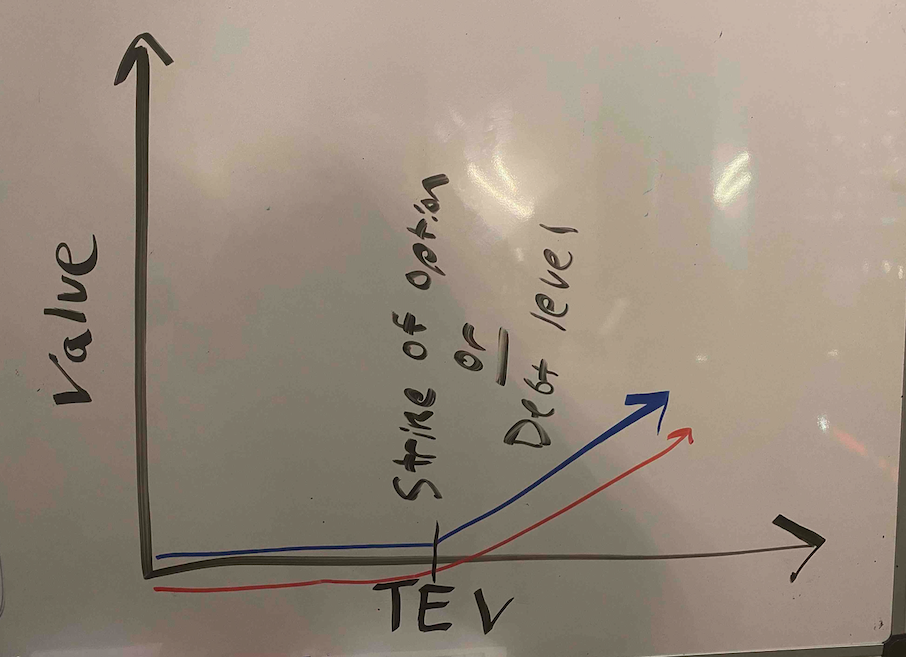
The common equity of a highly levered company can therefore be valued by a similar methodology as the call option: Black Scholes. If you remember back to finance class, increasing volatility will increase the value of an option.
In the search fund case, we’ve (hopefully) increased the (upside) volatility and therefore create more value than simply selling the company today.
A few more thoughts on investor economics
There are a few other ways to think about the economics you get as an investor to best understand if this is the deal for you.
First, you may want to think about how much your investment will be worth day 1. The key lever in this model is what discount this company is being bought for relative to fair market value. For example, the searcher may have proprietary sourced a great company and is buying it for 25% below what it would trade at in a brokered auction.
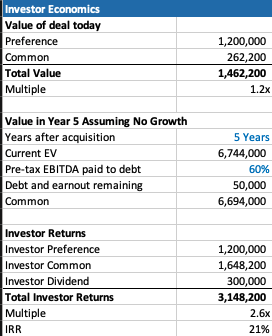
This is very much a “margin of safety” philosophy on things. Same with the calculation on how much you’ll receive in year 5 (after QSBS hits) assuming no growth in the business.
The only problem with each of these calculations is that they never play out in practice. Most companies don’t just stay the same, you’re either in a rising tide or you’re in trouble. And, you’re almost never going to sell in year 1, and definitely not for a slight premium to what it was bought for.
However, if your investment is worth 30% higher day one, and you can make a 20% IRR assuming nothing too crazy happens either way in the business, that’s not a bad place to start. Add in a strong searcher, decent market, some luck, and you’re off to the races.
Thoughts on searcher economics
A lot of this post has considered things from the investor perspective as my main quandary was related to how to create an EBITDA multiple that made sense for investors.
However, the point of this post is not to say searchers are misrepresenting or being unrealistic with their terms. In fact, I think it’s quite logical that self funded searchers capture the massive economic value that they do.
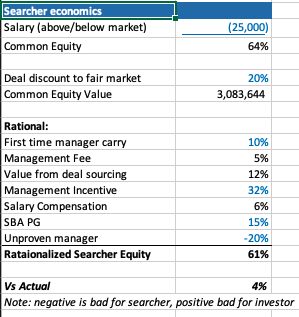
There are many reasons why self funded searchers deserve the lion share of the common equity.
First, they are providing a nice service of giving investors a positive expected value home to park their money with much lower correlation to the market than other asset classes ($1 mm EBITDA companies don’t see lots of multiple contraction/expansion throughout cycles).
Most money managers that fit that criteria are taking a 2/20, of course they also usually have a track record. So, I’ve used a 10% carry in my model, but stuck to 2% annual management fee.
The searcher spent a lot of time, and probably money, finding this company. That’s a lot of value, especially if it’s a below market price. They should be able to capture a lot of the value in finding a below market deal.
The searcher may be taking a below market salary, and needs to get comped like any CEO, with stock options. In my example model I have $1 mm of stock vesting over the hold period, as well as extra comp for taking a below market salary.
Searchers are also usually putting their financial standing at risk by taking a personal guarantee on the bank/SBA loan. This is really tough to put a number on, as is the last line in my framework where searchers are dinged for lack of experience. Like any good model, you need a few lines that you can fudge to make the math work 🙂
What you do think?
I’m shocked that I wrote all this. I was going to type a few paragraphs and a quick excel. However, putting this to paper has been a great exercise for me to sharpen my thinking.
Now I’d like you to help me further. Where do you think this should be changed in this framework? How do you think about things from the investor and/or searcher side?
Feel free to shoot me a note if you have thoughts (even just to tell me I’m being way too academic with this, which I actually agree with).
Lastly, a post like this is really a trap I’m putting on the internet to catch any like minded people in so that we can figure out ways to collaborate now or in the future. So, at the very least, connect with me on LinkedIn 🙂

Thanks for the marvelous posting! I certainly enjoyed reading it, you could be
a great author.I will make sure to bookmark your blog and will
eventually come back later in life. I want to encourage you to ultimately continue
your great work, have a nice day!
Appreciate the recommendation. Let me try it out.
Heya i am for the first time here. I found this board and I find It truly helpful & it helped me out much.
I hope to present one thing back and aid others such as
you aided me.
Thank you for some other informative web site. The place else may I get that kind of information written in such a perfect method?
I have a challenge that I’m simply now running on, and I’ve been on the look out for such information.
Greetings, I do believe your web site may be having internet browser compatibility problems.
Whenever I look at your website in Safari,
it looks fine but when opening in I.E., it has
some overlapping issues. I simply wanted to provide you with a quick heads
up! Other than that, wonderful blog!
Very nice article, just what I wanted to find.
Hi, Neat post. There’s an issue along with your website in internet explorer,
could test this? IE nonetheless is the market chief and a
good component to other folks will pass over your wonderful writing
due to this problem.
You made some good points there. I checked on the internet to
learn more about the issue and found most people will go along with your views on this web site.
Thanks for sharing your thoughts on madu sumbawa asli.
Regards
What’s up, this weekend is pleasant in support of me, for the reason that this point in time i am reading this fantastic informative paragraph here at my house.
Wow! In the end I got a website from where I be able to really get useful information regarding my study and knowledge.
Wow that was strange. I just wrote an really long comment but
after I clicked submit my comment didn’t appear.
Grrrr… well I’m not writing all that over again. Anyways, just
wanted to say great blog!
Article writing is also a fun, if you be familiar with after
that you can write if not it is difficult to write.
Hey there, I think your website might be having browser compatibility issues.
When I look at your blog site in Chrome, it looks fine but when opening
in Internet Explorer, it has some overlapping. I just wanted
to give you a quick heads up! Other then that, terrific blog!
Howdy! I know this is kinda off topic but I’d figured I’d ask.
Would you be interested in exchanging links or
maybe guest authoring a blog article or vice-versa?
My website discusses a lot of the same topics
as yours and I think we could greatly benefit from each
other. If you might be interested feel free to shoot
me an email. I look forward to hearing from you! Great blog by the
way!
Hi my friend! I want to say that this article is awesome, nice written and
include almost all significant infos. I’d like to look extra posts like this .
What i don’t realize is in truth how you are now not actually much more well-preferred than you might be now.
You are very intelligent. You realize thus considerably when it comes to this matter, produced me in my view consider
it from numerous numerous angles. Its like women and men don’t seem to be involved unless it’s one thing
to do with Woman gaga! Your personal stuffs excellent.
At all times handle it up!
It’s hard to find knowledgeable people on this topic, however, you seem like you know what you’re talking about!
Thanks
Excellent article! We are linking to this particularly great article on our website.
Keep up the good writing.
obviously like your website but you have to
take a look at the spelling on quite a few of your posts.
Several of them are rife with spelling issues and I find
it very troublesome to inform the truth then again I will definitely
come again again.
Hi! Do you know if they make any plugins to protect against hackers?
I’m kinda paranoid about losing everything I’ve worked hard on.
Any tips?
Have you ever thought about adding a little bit more than just your articles?
I mean, what you say is fundamental and all. But imagine if you added some great graphics or videos to give your posts more, “pop”!
Your content is excellent but with images and videos, this site could definitely be
one of the greatest in its niche. Superb blog!
I am not sure where you’re getting your information, but good topic.
I needs to spend some time learning much more or understanding more.
Thanks for magnificent information I was looking for
this information for my mission.
My spouse and I stumbled over here from a different web
page and thought I might check things out. I like what I see so i am just following you.
Look forward to exploring your web page again.
This web site really has all the information and facts I wanted concerning this subject and didn’t know who to ask.
You’ve made some really good points there. I looked on the web
for additional information about the issue and found most individuals
will go along with your views on this web site.
This is a topic that is near to my heart… Best wishes!
Exactly where are your contact details though?
I know this site gives quality depending articles and extra stuff,
is there any other site which presents such information in quality?
What’s up Dear, are you truly visiting this website daily,
if so afterward you will absolutely get nice know-how.
Hi everyone, it’s my first pay a visit at this website, and piece of writing is actually fruitful for me, keep up posting such posts.
First off I want to say terrific blog! I had a quick question in which I’d
like to ask if you do not mind. I was interested to find out how you center yourself
and clear your head before writing. I’ve had a tough time clearing my thoughts in getting my ideas out.
I truly do take pleasure in writing however it just seems like the first 10 to 15 minutes tend to be wasted just
trying to figure out how to begin. Any ideas or hints? Cheers!
Thanks for sharing your thoughts on slot deposit pulsa tanpa potongan. Regards
Wow, marvelous blog layout! How long have you been running a blog for?
you made blogging glance easy. The entire glance of your
website is fantastic, as smartly as the content!
Spot on with this write-up, I truly believe this web site
needs much more attention. I’ll probably be back again to read more, thanks for the
information!
Hi! I’ve been following your web site for a long time now and finally got the courage to go ahead and
give you a shout out from New Caney Tx! Just wanted to
tell you keep up the fantastic job!
hi!,I really like your writing very a lot! percentage we keep up a correspondence extra
about your article on AOL? I need a specialist in this house to unravel my problem.
May be that is you! Having a look forward to peer you.
Hey! This is kind of off topic but I need some guidance from an established
blog. Is it tough to set up your own blog? I’m not very techincal but
I can figure things out pretty fast. I’m thinking about creating my own but I’m
not sure where to begin. Do you have any points or suggestions?
With thanks
Hey There. I discovered your blog the use of msn. This is a really neatly written article.
I’ll be sure to bookmark it and come back to
read extra of your helpful information. Thank you
for the post. I will certainly comeback.
Howdy, i read your blog occasionally and i own a similar one and i was just wondering if you get a lot of spam remarks?
If so how do you prevent it, any plugin or anything you can advise?
I get so much lately it’s driving me mad so any help is very much appreciated.
My spouse and I stumbled over here by a different website and thought I should check things out.
I like what I see so now i am following you. Look forward
to finding out about your web page again.
Hey very cool website!! Man .. Beautiful ..
Wonderful .. I will bookmark your site and take the feeds additionally?
I’m satisfied to seek out a lot of useful information here within the submit,
we need develop extra strategies in this regard,
thank you for sharing. . . . . .
This is a topic that’s close to my heart… Thank you!
Where are your contact details though?
Terrific article! This is the type of information that are meant
to be shared around the internet. Shame on the seek engines
for no longer positioning this put up higher! Come on over and talk over with my site .
Thank you =)
It is actually a nice and useful piece of info. I’m happy
that you simply shared this helpful info with us.
Please stay us informed like this. Thanks for sharing.
hey there and thank you for your info – I have definitely
picked up something new from right here. I did however expertise some technical issues using this
site, as I experienced to reload the site lots of times previous to I could
get it to load properly. I had been wondering if your web host is OK?
Not that I’m complaining, but sluggish loading instances times will
sometimes affect your placement in google and could damage your high-quality score if advertising and marketing with
Adwords. Well I’m adding this RSS to my e-mail and can look out
for a lot more of your respective exciting content. Ensure that you
update this again very soon.
Hmm is anyone else experiencing problems with the pictures on this blog loading?
I’m trying to find out if its a problem on my end or if it’s
the blog. Any suggestions would be greatly appreciated.
Quality articles is the secret to interest the viewers to
go to see the website, that’s what this web page is providing.
This post is in fact a fastidious one it assists new the web people, who are wishing in favor of blogging.
Hello colleagues, how is all, and what you wish for to say regarding this piece of writing,
in my view its genuinely awesome for me.
Heya! I realize this is sort of off-topic however I needed
to ask. Does running a well-established blog like
yours require a large amount of work? I am completely new to writing a blog however I do write in my journal on a daily basis.
I’d like to start a blog so I can easily share my own experience and views online.
Please let me know if you have any suggestions or tips for brand new
aspiring bloggers. Appreciate it!